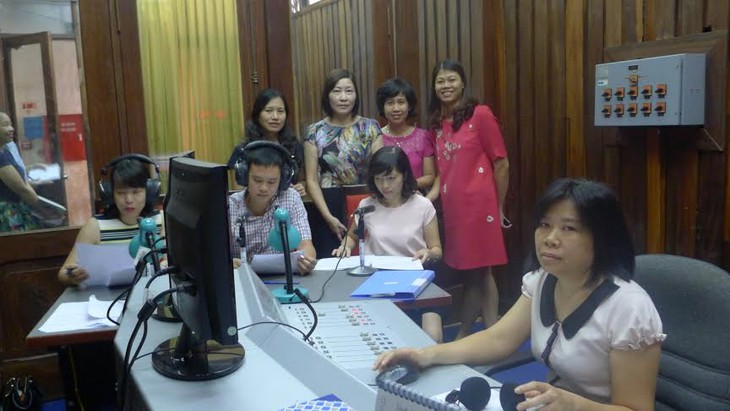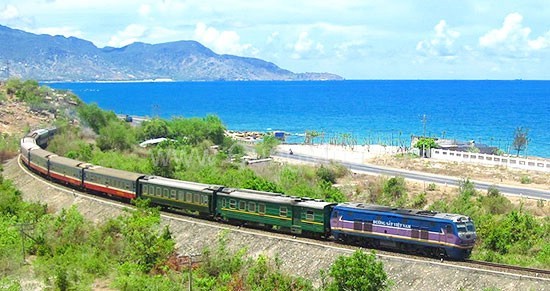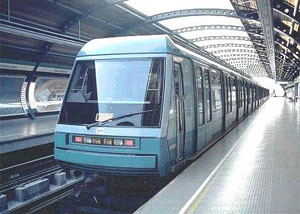Hello and welcome to VOV’s Letter Box, a weekly feature dedicated to our listeners throughout the world. We are Mai Phuong and Phuong Khanh.
A: Last week marked a milestone in VOV’s history and the VOV English Section’s history as well. On October 1st, we officially launched our 24/7 English channel which will broadcast daily on 104 FM to foreign listeners, overseas Vietnamese, English-speaking Vietnamese, and the foreign community in Vietnam.
B: We will be on the air daily from 06:00 am to midnight with live broadcasts from 08:00 to 10:00 am and from 6:00 to 8:00 pm.

VOV's 24/7 English program launched |
A: Our programming will cover politics, economics, culture, society, music, and entertainment. Our features include News and Current Affairs, Economy, Discovery Vietnam, Doctor at Home, Food Delight, Culture Rendezvous, What’s on, Colorful Vietnam-Vietnam’s 54 Ethnic Groups, Learning English on the Radio, Learning Vietnamese, and more.
B: Our channel will serve as a bridge linking Vietnam with our international friends. The best programming is now on VOV 24/7 on 104 FM and at www.vovworld.vn.
A: Dear listeners around the world! Now you have another channel on which to learn about Vietnam, its land and people and also to learn Vietnamese. Check it out at www.vovworld.vn.

VOV's 24/7 English program launched |
B: If you like our programs, want to contribute to our programs, and are willing to share your stories about your home country’s culture, please contact us at vovenglishsection@gmail.com.
A: In an email to VOV this week, Christer Brunstrom reported listening to our broadcast on September 26 at 17 UTC on the frequency of 9625 khz with a SINPO of 45444. Christer had a question about Vietnam’s railway system.
B: The Vietnamese railway network has a total length of 2,600 kilometers including a 1,726 kilometer-single track north-south railway running between Hanoi and Ho Chi Minh City. There are more than 270 stations on the network, most of them along the north-south line. The Vietnamese railway network is owned and operated by the state-owned enterprise Vietnam Railway.

The Vietnamese railway network has a total length of 2,600 kilometers. |
A: In 2008, the Ho Chi Minh City authority approved the construction of a subway system comprising four lines. The Ho Chi Minh City Metro project is managed by the city's Management Authority for Urban Railways (MAUR), a government unit working directly under the Chairman of the People's Committee of Ho Chi Minh City.
B: The city’s transport development master plan to 2020 envisages developing three monorails or light rail lines with a total length of 37 kilometres and six underground metro routes with a total length of 107 kilometers. Ben Thanh in District 1, already a major hub for bus traffic, will become a major hub connecting several lines.
A: The Ben Thanh-Suoi Tien metro system, the first in Ho Chi Minh City, will cost 2.49 billion USD- 2.2 billion USD from Japanese loans and the remaining 290 million USD from the city’s budget.

In 2008, the Ho Chi Minh City authority approved the construction of a subway system comprising four lines |
B: This subway line, which will have a total length of 19.7km, including 2.6km underground, will run through 14 stations, three of them underground, and will connect Ben Thanh Market and Suoi Tien Amusement Park in District 9. The megaproject is scheduled for completion in 2020.
A: According to the subway project’s master plan, an 18,000-square meter area underneath Le Loi Street will be zoned for the construction of commercial facilities. The metro train will have a maximum speed of 80kph underground, and 110kph aboveground, allowing passengers to travel from Suoi Tien to the downtown area in approximately 29 minutes.
B: Vietnam's road system comprises more than 222,000 km of road. Expressways are rather a new concept for Vietnam. Expressways would reduce the safety problem along key corridors by separating high speed traffic from slower, local traffic.
A: Viet Nam currently recognizes two classes of expressway. Both have a minimum of two lanes in each direction. There are 4 designed-speed categories: 60, 80, 100 and 120 km/h. Generally all cars, buses and trucks are permitted on expressways but not motorcycles of less than 70 cc.
B: Vietnam has more than 17,000 km of waterways; 5,000 km of which are navigable by vessels up to 1.8 m draft. Vietnam operates 37 civil airports, including three international gateways: Noi Bai, Da Nang, and Tan Son Nhat. Tan Son Nhat international airport in Ho Chi Minh city is the largest, handling 75 percent of international passenger traffic.
A: That’s a short take on Vietnamese railways and other transportation. This week, we’d like to welcome back to our show Tjang Pak Ning of Indonesia who has been absent from our broadcasts for a few months.
B: Listening to our broadcast on October 6 from 10:00 to 10:27 on the frequency of 9840 khz, Tjang Pak Ning rated SINPO at all 4s.
A: Kamal Hossain of Bangladesh has confirmed that he received VOV certificate of merit and award for participating in VOV’s contest “What do you know about Vietnam”.
B: Congratulations, Kamal. SB Sharma of India in an email to VOV this week wrote: “After recovering from some sad news, I’ve again started to connect with you. My award has still not arrived. Please send it by registered post to ensure delivery”.
A: Mr. Sharma, we’ve sent out all the certificates and awards. We’ll check again to find out if they’ve been delivered. We hope to hear more from you.
B: In his letters to VOV this week, Grant Skinner of the UK reported technical details of his reception of our program on September 7th on 7280 khz. He wrote: “Sounded like loud waves. The other frequency number you have at this time 9730 is the same as before and lately another radio station has been more prominent than Voice of Vietnam”.
A: Thank you Grant for your useful information. We’ll forward your reception report to our technicians.
B: Debakamal Hazarika of India listened to our program on September 19 on the frequency of 9550 khz with SINPO of 44344. He wrote: “I have listened to your “Weekend Music Show”. I always feel pleasure enjoying your nice and important programs. Today, I listened to some nice Vietnamese rock and pop music performed by a male singer. Your program is very good source of information about Vietnam’s wonderful songs and singers. I found today’s program really entertaining and very enjoyable”.
A: Thank you, Debakamal Hazarika, for tuning in to VOV. We also received a letter from Hannu Kiiski of Finland. He reported listening to an English Program, which we think was not the Voice of Vietnam. Hannu, please check out our frequency list to find the right VOV program. It’s on our website at www.vovworld.vn. We’ll send you a hard cope of the list and a program schedule by post to make sure that you’re tuned to the right broadcast.
B: We’d like to acknowledge emails and letters from Taguchi Norizumi, Toshiya Nishimura, Takao Mizuike, and Fumito Hokamura of Japan, Richard Lemke of Canada, Ratan Kumar Paul of India, and Rabi Sankar Bosu of India, and David Ansell of the UK. We’ll send you QSL cards, frequency lists, and program schedules soon.
B: We welcome your feedback at: English section, VOV World Service, Voice of Vietnam, 45 Ba Trieu Street, Hanoi, Vietnam. Or you can email us at: englishsection@vov.org.vn. Tune in to additional English programs on our website at vovworld.vn. Good bye. See you next time.